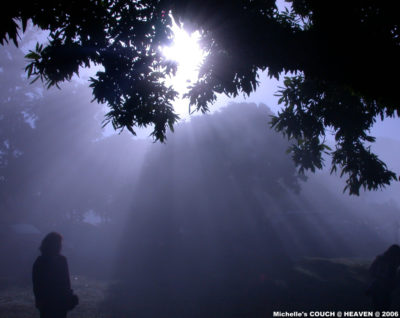Now on his way to Jerusalem, Jesus traveled along the border between Samaria and Galilee. As he was going into a village, ten men who had leprosy met him. They stood at a distance and called out in a loud voice, “Jesus, Master, have pity on us!” When he saw them, he said, “Go, show yourselves to the priests.”
And as they went, they were cleansed.
One of them, when he saw he was healed, came back, praising God in a loud voice. He threw himself at Jesus’ feet and thanked him – and he was a Samaritan. Jesus asked, “Were not all ten cleansed? Where are the other nine? Was no one found to return and give praise to God except this foreigner?” Then he said to him, “Rise and go; your faith has made you well.” – Luke 17:11-19 (NIV)
I invite you today to spend a few moments in silence. Offer a prayer of thanks to God for all the places in which you experience community – church, family, your workplace. Thank God for inviting you into community with him. You don’t have to stand at a distance!
Slowly read through Luke 17:11-19. You may want to continue to imagine yourself as a person in the story. This week we will focus our attention on verse 14 of this passage: “When he saw them, he said, ‘Go, show yourselves to the priests.’ And as they went, they were cleansed.”
Even though these men stood at a distance, Jesus saw them. Jesus made a choice to see these men. He could have ignored their cries. No one would blame him for wanting to avoid their disease. Are you ever tempted to shift your gaze from things that are hard or messy?
Jesus heals people in many different ways throughout the Gospels. Can you recall some of them? Jesus healed a blind man with a mixture of spit and dirt. A woman was healed just by touching his clothes. What does this variety say to you about how Jesus sees people?
Unlike some of the other healing stories, these men weren’t immediately healed. “As they went” they were healed. As they obeyed Jesus’ instruction, the healing began. Has there been a time in your life when obedience was linked with healing?
In the time when this event took place, a priest had the authority to give a person a clean bill of health and allow them re-entry into the community. What, then, were the risks associated with Jesus’ instructions?
“And as they went, they were cleansed.”
This feels like a progression of obedience and healing. In what areas have you felt yourself being progressively cleansed by God? Is there an area in which you long for more cleansing? Ask God for that now. Perhaps you feel invited to follow the leper’s model and ask Jesus for pity.
Thank God for the blessings of your day. Ask him for guidance as you live the rest of your day.
Be at peace knowing that you are being made whole by Jesus.









